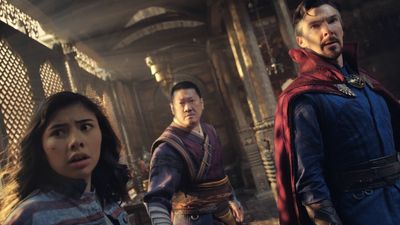'Doctor Strange in the Multiverse of Madness’ is the MCU at its Most Extreme [Review]
Doctor Strange in the Multiverse of Madness, the first MCU movie of 2022, is a convoluted but exhilarating experience.
Toward the beginning of Batman V. Superman: Dawn of Justice, a skeptical, but fair U.S. senator reflected on a political dilemma regarding the Man of Steel. “The world has been so caught up with what Superman can do, that no one has asked what he should do,” she said. She’s talking about Superman, but she might as well be summarizing the recent history of the Marvel Cinematic Universe. Since regaining access to Spider-Man through a situational partnership with Sony and grabbing X-Men, Deadpool, Daredevil and a host of other heroes from 21st Century Fox and Netflix, the MCU has transformed into a time-traveling, universe-surfing extravaganza, introducing personalities, alternate worlds and mostly middling miniseries with little regard for excess — like someone who got zooted right before hitting Trader Joe’s and bought a bunch of shit they didn’t need just because it was there.
At their best, the new MCU projects used long-since-developed backstories and some fairly judicious world-building to create self-contained flicks that travel to different plains of existence without leaving meaningful character interactions and smooth storytelling behind. Released in theaters everywhere today (May 6), Doctor Strange in the Multiverse of Madness is the MCU’s latest attempt to create the same effect. Convoluted, yet intermittently exhilarating, Multiverse doesn’t quite reach that lofty goal, but deft direction, one powerful performance and sound-enough writing ensure it’s a worthy entry into the MCU continuum.
The film takes place after the events of WandaVision and Spider-Man: No Way Home, two projects that tampered with time, space and reality as characters learned the heart-wrenching consequences of doing so. In this story, Dr. Strange (Benedict Cumberbatch) is thrusted into conflict once again when he attempts to save the life of America Chavez (Xochitl Gomez), a teen who’s got the ability to travel to different universes. Because of her talents, Chavez has become the target of Wanda Maximoff (Elizabeth Olsen), an Avenger who dipped her toes into villainy when she mind-controlled an entire town in WandaVision. Reeling from the loss of two children she created using her powers, Wanda wants to extract Chavez’s gifts so she can freely travel the multiverse, which contains at least one world where her children actually exist. Using a forbidden new resource that corrupts its wielder. Wanda’s pretty much gone over to the dark side, christening herself The Scarlet Witch, and it’s up to Dr. Strange to save the day.
Making his heroic return is director Sam Raimi, who famously helped reinvigorate superhero movies when he helmed Spider-Man in 2002. That’s his biggest accomplishment, but his knack for macabre, slapstick horror flicks is what made him famous. While the aesthetics of Multiverseremain mostly vibrant, Raimi infuses the film with shots of inventively gruesome violence found in his earlier works like the campy 1981 classic The Evil Dead. Here, we see Wanda get bloody, and her new enemies – a hilariously named alternate universe Avengers squad of various MCU and former Fox properties – get bloodier as she lets loose one ruthless one-liner after another. Macabre, yet fun, it’s an entertaining addition to the MCU toolbox, which can be monotonously colorful after 28 films.
There’s innovation in the direction, the plot of Multiverse feels like a more souped-up, but emptier version of Spider-Man: No Way Home or Avengers: Endgame, with even more exploration but less heart. Given the many layers of the plot, the story moves as efficiently as it can, as multiversal travel and obscure magical forces require constant explanation. Still, things begin to feel a little repetitive after the fifth or sixth time someone tells a new character they’re from another world. The exposition, numerous scenery changes, and continually unspooling rules of magic create a disorienting effect that leaves you feeling like you’re always catching up with what’s going on rather than gripping onto the central story. And when fight scenes unfold as you’re deciphering the plot, it can begin to feel like a generic superhero flick with big CGI blasts.
All this activity also sucks out room for characterization. Chavez, whom Xochitly Gomez renders with charm and palpable innocence, isn’t left with much to do but run, and without prior stories to contextualize her character, her presence doesn’t feel like much more than a tool to advance the plot. Additionally, the exact nature of Chavez’s powers is somewhat unclear; she’s only able to tap into her abilities when she’s feeling overwhelmingly frightened – until one day, after a pep talk from Dr. Strange, she’s conveniently able to do so. Meanwhile, Dr. Strange, essentially a Tony Stark who went to therapy, wrestles with commitment issues and the necessary permanence of time as a by-the-numbers, but serviceable subplot unfolds.
One person who doesn’t suffer from a frenetic plot is Maximoff, whose watery eyes, facial tremors and furious death glares evoke grief and exasperation as she descends further into madness. In the original Avengers films, she comes across as one of the more docile heroes, but, in the wake of losing her boyfriend Vision and her self-concocted family, she’s become one of the MCU’s more ruthless villains. It’s a transformation that fulfills a need for character development in a film that’s almost too jumpy for its own good.
Between multiple universes, a bunch of characters, a bunch of rules and even more cameos, Doctor Strange in the Multiverse of Madness is the MCU at its maximalist extreme. It mostly trades catharsis for adventure, but Olsen’s performance and Raimi’s kinetic direction are enough to make you happy to come along for the ride.
__
Peter is a writer and editor who covers music, movies, and all things dope.
